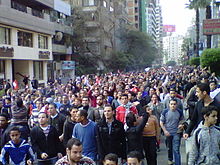- Cliodynamics
-

Cliodynamics (etymologically from Clio, one of the nine muses (that of history), and dynamics, the study of temporally varying processes) is a new multidisciplinary area of research focused at mathematical modeling of historical dynamics.[1]
Contents
Origins
The term was originally coined by Peter Turchin in 2003, and can be traced to the work of such figures as Ibn Khaldun, Jack Goldstone, Randall Collins, Peter Turchin, John Komlos, Sergey Nefedov and Andrey Korotayev.
Mathematical modeling of historical dynamics
Many historical processes are dynamic (a dynamic process is one that changes with time). Populations increase and decline, economies expand and contract, while states grow and collapse. A very common approach, which has proved its worth in innumerable applications (particularly, but not exclusively, in the natural sciences), consists of taking a holistic phenomenon and mentally splitting it up into separate parts that are assumed to interact with each other. This is the dynamical systems approach, because the whole phenomenon is represented as a system consisting of several interacting elements (or subsystems). In the dynamical systems approach, one must describe mathematically how different subsystems interact with each other. This mathematical description is the model of the system, and one can use a variety of methods to study the dynamics predicted by the model, as well as attempt to test the model by comparing its predictions with the observed dynamics. This is the approach that the cliodynamics suggests to apply to the study of historical dynamics.
Isaac Asimov employed a fictional version of this discipline, called psychohistory, as a major plot device in his Foundation series of science fiction novels.
Achievements
At the moment in this realm the main achievements have been made with respect to the mathematical modeling of long-term ("secular") cycles of sociodemographic dynamics [2], the mathematical modeling of the extreme long-term ("millennial") trends of the World System dynamics,[3] and demographic-structural models of the Modern Age revolutions, including the Arab revolutions of 2011. [4]
Cliodynamics: The Journal of Theoretical and Mathematical History
Cliodynamics: The Journal of Theoretical and Mathematical History is a peer-reviewed web-based (free-access) journal that publishes both empirical and modeling articles. Editors are particularly interested in articles that combine model development with empirical tests. The journal also seeks to publish databases, methodological articles, and critical commentaries on articles published in the journal and on general issues in theoretical and quantitative history.
The first issue of Cliodynamics: the Journal was published in November 2010.
See also
Notes
- ^ Peter Turchin Arise cliodynamics, 2008 Nature (3 July 2008)
- ^ Turchin P. 2003. Historical Dynamics: Why States Rise and Fall. Princeton, NJ: Princeton University Press; Turchin P., Andrey Korotayev. 2006. Population Dynamics and Internal Warfare: A Reconsideration. Social Evolution & History 5(2): 112–147; Turchin P., Nefedov S. 2009. Secular Cycles. Princeton, NJ: Princeton University Press; Korotayev, A., Malkov, A., & Khaltourina, D. 2006b. Introduction to Social Macrodynamics: Secular Cycles and Millennial Trends. Moscow: URSS. ISBN 5484005590; Korotayev, A. & Khaltourina D. 2006 Introduction to Social Macrodynamics: Secular Cycles and Millennial Trends in Africa. Moscow: URSS. ISBN 5484005604.
- ^ Tsirel, S. V. 2004. On the Possible Reasons for the Hyperexponential Growth of the Earth Population. Mathematical Modeling of Social and Economic Dynamics / Ed. by M. G. Dmitriev and A. P. Petrov, pp. 367–9. Moscow: Russian State Social University, 2004; Korotayev A., Malkov A., Khaltourina D. 2006. Introduction to Social Macrodynamics: Compact Macromodels of the World System Growth. Moscow: URSS. ISBN 5-484-00414-4; Andrey Korotayev. The World System urbanization dynamics. History & Mathematics: Historical Dynamics and Development of Complex Societies. Edited by Peter Turchin, Leonid Grinin, Andrey Korotayev, and Victor C. de Munck. Moscow: KomKniga, 2006. ISBN 5-484-01002-0. P. 44-62 etc.
- ^ Goldstone J. 1991. Revolution and Rebellion in the Early Modern World. Berkeley, California: University of California Press; Turchin P. et al., eds. 2007. History & Mathematics: Historical Dynamics and Development of Complex Societies. Moscow: KomKniga. ISBN 5484010020; Turchin P., Nefedov S. 2009. Secular Cycles. Princeton, NJ: Princeton University Press; Korotayev A., Zinkina J. Egyptian Revolution: A Demographic Structural Analysis. Entelequia. Revista Interdisciplinar 13 (2011): 139-169.
Bibliography
- Goldstone J. 1991. Revolution and Rebellion in the Early Modern World. Berkeley, California: University of California Press.
- Komlos J., Nefedov S. 2002. Compact Macromodel of Pre-Industrial Population Growth. Historical Methods. (35): 92–94.
- Korotayev A., Malkov A., Khaltourina D. 2006a. Introduction to Social Macrodynamics: Compact Macromodels of the World System Growth. Moscow: URSS. ISBN 5-484-00414-4 .
- Korotayev, A., Malkov, A., & Khaltourina, D. 2006b. Introduction to Social Macrodynamics: Secular Cycles and Millennial Trends. Moscow: URSS. ISBN 5484005590
- Korotayev, A. & Khaltourina D. 2006 Introduction to Social Macrodynamics: Secular Cycles and Millennial Trends in Africa. Moscow: URSS. ISBN 5484005604
- Korotayev A., Zinkina J. Egyptian Revolution: A Demographic Structural Analysis. Entelequia. Revista Interdisciplinar 13 (2011): 139-165.
- Turchin P. 2003. Historical Dynamics: Why States Rise and Fall. Princeton, NJ: Princeton University Press.
- Turchin P. 2006. Population Dynamics and Internal Warfare: A Reconsideration. Social Evolution & History 5(2): 112–147 (with Andrey Korotayev).
- Turchin P. et al., eds. 2007. History & Mathematics: Historical Dynamics and Development of Complex Societies. Moscow: KomKniga. ISBN 5484010020
- Turchin P., Nefedov S. 2009. Secular Cycles. Princeton, NJ: Princeton University Press.
External links
- Cliodynamics Internet site
- Russian Cliodynamic Community (also in English, Spanish, and Arabic)
- Peter Turchin's Web Page
- Arise Cliodynamics
- Why do we need mathematical models of historical processes?
- War and Peace and War at InterSci Complexity wiki
- Historical Dynamics at InterSci Complexity wiki
- Introduction to Social Macrodynamics: Compact Macromodels of the World System Growth
- Introduction to Social Macrodynamics: Secular Cycles and Millennial Trends at InterSci Complexity wiki
- Historical Dynamics in a time of Crisis: Late Byzantium, 1204-1453 (a discussion of some concepts of cliodynamics from the point of view of medieval studies)
Categories:- Economic history
- Social history
- Theories of history
- Econometrics
- Mathematical modeling
Wikimedia Foundation. 2010.

